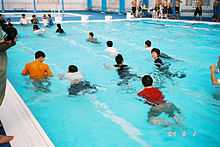Lifesaving

Lifesaving is the act involving rescue, resuscitation and first aid. It often refers to water safety and aquatic rescue however it could include ice rescue, flood and river rescue, swimming pool rescue and other emergency medical services. Lifesaving also refers to sport where lifesavers compete skills, speed and team work. Lifesaving activities specialized in oceanic environment is called surf lifesaving or coastal lifesaving.
Those who participate in lifesaving activities as a volunteer are called lifesavers, and those who are employed to perform lifesaving activities are called lifeguards.
History
Origins

The first life saving organization, the Royal National Institution for the Preservation of Life from Shipwreck, was established in England in 1824 by Sir William Hillary.[1] While living on the Isle of Man in 1808, he became aware of the treacherous nature of the Irish Sea, with many ships being wrecked around the Manx coast. He soon drew up plans for a national lifeboat service manned by trained crews, but received little response from the Admiralty.
However, on appealing to the more philanthropic members of London society, the plans were adopted and, with the help of two Members of Parliament (Thomas Wilson and George Hibbert), the National Institution for the Preservation of Life from Shipwreck was founded in 1824.
One of the Institution's first rescues was of the packet St George, which had foundered on Conister Rock at the entrance to Douglas Harbour. Sir Hillary took part in the successful operation and everyone was ultimately rescued.[2] Thirty years later the Institution's title was changed to the Royal National Lifeboat Institution and the first of the new lifeboats to be built was stationed at Douglas in recognition of Hillary's work.
Spread

Similar services were established in other countries, in Belgium (1838), Denmark (1848), United States (1848), Sweden (1856), France (1865), Germany (1885), Turkey (1868), Russia (1872), Italy (1879) and Spain (1880). In 1891 the Royal Life Saving Society was created to affiliate British and Irish lifesaving and lifeguarding clubs. It expanded its operations to Canada and Australia in 1894. In 1913 the DLRG was founded in Germany.
The first international lifesaving conference was held in Marseilles, France in 1878, but it was not until 1910 that the first international lifesaving organization, FIS (Fédération Internationale de Sauvetage Aquatique), was founded.
In 1971 Australia, Great Britain, New Zealand, South Africa and the United States founded another international organization called World Life Saving (WLS). FIS and WLS merged into a new organization, International Life Saving Federation (ILS) in 1993 with its headquarters in Leuven, Belgium.
Activities

Surf lifesaving developed in Australia and is often simply called "lifesaving". It focuses on drowning prevention and rescue in a coastal setting. General lifesaving does not limit its activities to beaches - its aim is to promote water safety around ponds, lakes, rivers, in the home and in any other applicable environments. This is why landlocked countries like Switzerland, Austria, Kazakhstan, Macedonia, Serbia, Azerbaijan, Czech Republic and Slovakia, are also full members of ILS.
Lifesavers are volunteers and usually stationed at a club house. They provide training for lifesaver/lifeguard qualifications as well as educating the general public.
Lifesaving sport
Life saving has become a growing sport in many countries. The sport can be played indoors in swimming pools or outside on beaches, in the same way that you get pool lifeguards and beach lifeguards. Life saving sport is the only sport in the world that has a humanitarian purpose: to train better life savers and life guards.
The ILS advises that 'lifesaving sport was primarily intended to encourage lifesavers to develop, maintain and improve the essential physical and mental skills needed to save lives in the aquatic environment.' The sport consists of a series of competition disciplines intended 'to further develop and demonstrate lifesaving skills, fitness and motivation'.[3]
The World Governing body for life saving sport is the ILS. Each nation within has a national governing body. In some nations (including the United Kingdom, Australia and New Zealand) there are numerous governing bodies affiliated to the ILS. This is often due to various components of life saving within a nation being focused on by separate organisations. (e.g. Royal Life Saving Society focusing mainly on pool safety and Surf Life Saving Association focusing on beach safety.) Every two years the ILS organises the Lifesaving World Championships, called 'Rescue' Series.
Competitive lifesaving is carried out widely in the UK, with great clubs including Derby Phoenix Lifesaving and Crawley. Competitions at university level are organised through BULSCA. Lifesaving has progressed significantly becoming a modern and widely known sport and occupation.
See also
- Commonwealth Pool Lifesaving Championships
- Lifeguard
- Royal Life Saving Society Australia
- Royal Life Saving Society Commonwealth
- Royal Life Saving Society of Canada
- Surf lifesaving
- United States Lifesaving Association
- Rashtriya Life Saving Society (India)
- Beach Run
- Surf ski
References
- ↑ "lifesaving". Retrieved 2012-12-17.
- ↑ Visit Isle of Man.
- ↑ "Lifesaving Sport Events". International Life Saving Federation. Retrieved 29 July 2013.
| ||||||||||||||||||||||||||
| ||||||||||||||||||||||
